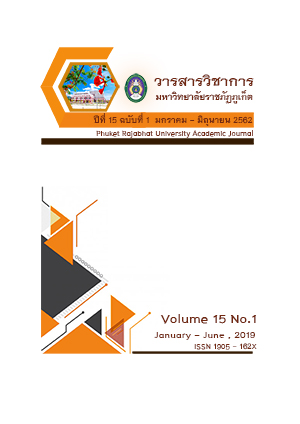กระบวนทัศน์การแสวงหาความรู้สู่การวิจัย
Main Article Content
บทคัดย่อ
กระบวนทัศน์การแสวงหาความรู้สู่การวิจัย ซึ่งผู้วิจัยจำเป็นจะต้องมีการคิดเชิงเหตุผล อันเป็นฐานรากของการคิดเชิงปรัชญา การวิเคราะห์นำมาสู่การสังเคราะห์ ตกผลึกเป็นข้อสรุป ด้วยวิธีนิรนัยหรืออุปนัยหรือผสมผสานกัน จากนั้นนำไปสู่การเลือกวิธีวิทยาหรือระเบียบวิธีการวิจัย อันเป็นการแสวงหาความรู้ความจริง ซึ่งมีทั้งกระบวนทัศน์ปฏิฐานนิยมอันเป็นการวิจัยเชิงปริมาณที่ให้ความสำคัญแก่วิธีการที่นักวิจัยสามารถจัดการกับสิ่งที่ต้องการศึกษาและกระบวนการวิจัยได้ทุกขั้นตอน ส่วนปรัชญาพื้นฐานการวิจัยกระบวนทัศน์ทางเลือกหรือปรากฏการณ์นิยมอันเป็นการวิจัยเชิงคุณภาพ ที่ให้ความสำคัญแก่วิธีการที่ทำให้นักวิจัยและผู้ที่ถูกศึกษามีความสัมพันธ์ที่ดีต่อกัน อย่างไรก็ตามทุกกระบวนทัศน์ของการศึกษาต่างมีทั้งจุดเด่นและจุดด้อยในตัวเอง วิธีการที่ให้ได้มาซึ่งความรู้ความจริงอีกทางเลือกหนึ่งที่นิยมใช้กันคือการวิจัยแบบผสมผสานกันทั้งสองแบบ ทั้งนี้การเลือกใช้แนวทางการแสวงหาความรู้แบบใด ต้องมีวัตถุประสงค์อันเป็นเป้าหมายนำไปสู่การตอบคำถามและตอบวัตถุประสงค์การวิจัย
Article Details
เนื้อหาและข้อมูลในบทความที่ลงตีพิมพ์ในวารสารวิชาการมหาวิทยาลัยราชภัฏภูเก็ต ถือเป็นข้อคิดเห็นและความรับผิดชอบของผู้เขียนบทความโดยตรง ซึ่งกองบรรณาธิการวารสารฯ ไม่จำเป็นต้องเห็นด้วยหรือร่วมรับผิดชอบใด ๆ
บทความ ข้อมูล เนื้อหา รูปภาพ ฯลฯ ที่ได้รับการตีพิมพ์ในวารสารวิชาการมหาวิทยาลัยราชภัฏภูเก็ต ถือเป็นลิขสิทธิ์ของวารสารวิชาการมหาวิทยาลัยราชภัฏภูเก็ต หากบุคคลหรือหน่วยงานใดต้องการนำทั้งหมดหรือส่วนหนึ่งส่วนใดไปเผยแพร่ต่อหรือเพื่อกระทำการใด ๆ จะต้องได้รับอนุญาตเป็นลายลักษณ์อักษรจากวารสารวิชาการมหาวิทยาลัยราชภัฏภูเก็ตก่อนเท่านั้น
เอกสารอ้างอิง
Chuto, N. (2005). Qualitative research Social Sciences. In training materials. Research and Development Institute: Suan Dusit Rajabhat University.
Denzin, N. K., & Yvonna S. Lincoln. (Eds.). (1998). The Landscape of Qualitative Research : Theories and Issues. Thousand Oaks, CA:Sage
Guba, E. G. (1990). The Paragigm Dialog. (E.G. Guba, Ed.) Newbury Park. California : SAGE.
Imsiri, P. (2010). Journalism Research. Pathum Thani: Valaya Alongkorn Rajabhat University Under the royal patronage.
Imsiri, P. (2013). Basic philosophy Creating knowledge through research in communication. Valaya Alongkorn Review. Vol.3, no. 1, p.8.
Juangtragoon, J. (2008). Qualitative Research: Knowledge Building Tools for National Development (1) Daradigms, Strategies and Research Methods. Bangkok : Business Law Center International Company Limited.
Kenaphoom, S. (2013). Creating Conceptual Frameworks for Research and Creating Strategies from Research bases in Public Administration. Teaching Mahasarakham Rajabhat University.
Khun, Thomas. (1970). “The Structure of Scientific Revolution”. Chicago : University of Chicago.
Lincoln, Y. S. and Guba, E. G. (1994). Competing Paradigm in Qualitative Research. Thousand Oaks. CA: Sage.
Prilleltensky, I. (2006). Community Psychology: In Pursuit of Well-being and Liberation, Department of Human and Organizational Development, Vanderbilt University. RetrievedSeptember 10, 2009 from http://people.vanderbilt.edu/~isaac.prilleltensky/teaching.html
Phradhammakosajarn. (2007). Greek Philosophy: Origins of Western Wisdom. (6th Edition). Bangkok : Siam Printing.
Pichay Ratanadilok Na Phuket. (2012). Philosophy Social Science and Paradigm in Pursuit of Knowledge. Journal of Bangkokthonburi University. Vol.1, no. 1, 85-87.
Matin, M, (Eds.). (1994). Readings in the Philosophy of Social Science. Massachusetts: MIT Press.
Sotthiphan, S. (2002). Basic Principles of Scientific Research: Scientific Discovery of Science. Bangkok : Department of Biology Prince of Songkla University.
Srisaard, B. (1992). Preliminary Research. (2nd Edition). Bangkok : Suweeriyasarn.
Suwan, M. (2001). Research Methods in Social Science and Humanities. Bangkok : Odeon Store Printing.
Von Wright, G. H. (1971). Explanation and Understanding. New York: Cornell University Press.


